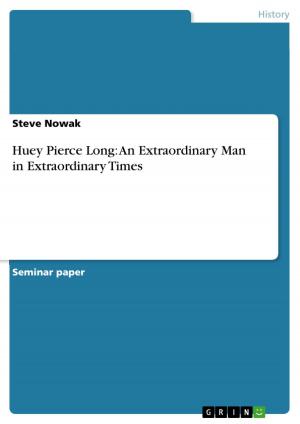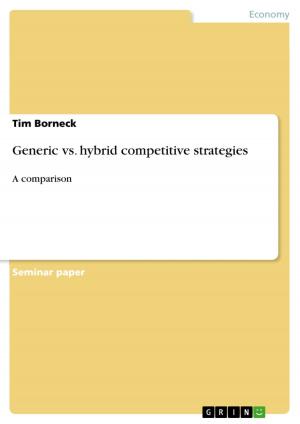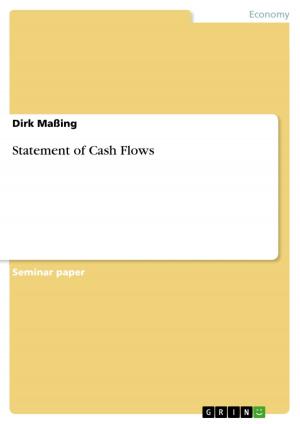The effects of the Bosman-case on the professional football leagues with special regard to the top-five leagues
Nonfiction, Social & Cultural Studies, Political Science| Author: | Daniel Schmidt | ISBN: | 9783640096909 |
| Publisher: | GRIN Publishing | Publication: | April 27, 2008 |
| Imprint: | GRIN Publishing | Language: | English |
| Author: | Daniel Schmidt |
| ISBN: | 9783640096909 |
| Publisher: | GRIN Publishing |
| Publication: | April 27, 2008 |
| Imprint: | GRIN Publishing |
| Language: | English |
Bachelor Thesis from the year 2007 in the subject Politics - International Politics - Topic: European Union, grade: 1,0, University of Twente (Political Institute ), language: English, abstract: [...] Nonetheless, important changes happened on the club level. On the 6th of April 2001 Energie Cottbus was the first club in the Bundesliga that played with 11 non-German players (Kicker, 8th April 2001). This extreme case shows that significant changes have taken place after the ruling. Clubs require more players from other countries, and competition for the superstars of sport has become enormous. The aim of this paper is to identify the changes, which have come up for soccer due to the Bosman case. Therefore the main question will be the following: How did the Bosman-case affect the European football leagues, and especially the top-five leagues (England, Italy, Spain, Germany and France)? In order to answer this question many different dimension have to be taken into consideration, since the Bosman case revolutionized football in more than one way. Thus aspects, which have to be mentioned here, include the changed number of foreign football players in the European leagues, the new transfer system, the new competitiveness situation as well as the financial development of the clubs. Sub-questions, which need to be answered in order to support the main questions, are: What is the historical relation between the EU law and sport law? What exactly is the content of the Bosman case? Which additional sport cases where decided by the ECJ after the Bosman ruling? How did the clubs react to the changed rules? Where the players able to benefit from the Bosman ruling, and if so how exactly? Has the competitive balance situation changed after Bosman? Are there also other reasons that can explain a changed situation? In the first part the question about the exact relation between the EU and the sport law will be answered. Sport still enjoys a certain freedom and can implement rules and laws, which are limited to the field of sport, but the EU is driving back this freedom. Thus measures and statements, which were taken by EU officials, will be examined, in order to show why the Bosman case was possible. [...]
Bachelor Thesis from the year 2007 in the subject Politics - International Politics - Topic: European Union, grade: 1,0, University of Twente (Political Institute ), language: English, abstract: [...] Nonetheless, important changes happened on the club level. On the 6th of April 2001 Energie Cottbus was the first club in the Bundesliga that played with 11 non-German players (Kicker, 8th April 2001). This extreme case shows that significant changes have taken place after the ruling. Clubs require more players from other countries, and competition for the superstars of sport has become enormous. The aim of this paper is to identify the changes, which have come up for soccer due to the Bosman case. Therefore the main question will be the following: How did the Bosman-case affect the European football leagues, and especially the top-five leagues (England, Italy, Spain, Germany and France)? In order to answer this question many different dimension have to be taken into consideration, since the Bosman case revolutionized football in more than one way. Thus aspects, which have to be mentioned here, include the changed number of foreign football players in the European leagues, the new transfer system, the new competitiveness situation as well as the financial development of the clubs. Sub-questions, which need to be answered in order to support the main questions, are: What is the historical relation between the EU law and sport law? What exactly is the content of the Bosman case? Which additional sport cases where decided by the ECJ after the Bosman ruling? How did the clubs react to the changed rules? Where the players able to benefit from the Bosman ruling, and if so how exactly? Has the competitive balance situation changed after Bosman? Are there also other reasons that can explain a changed situation? In the first part the question about the exact relation between the EU and the sport law will be answered. Sport still enjoys a certain freedom and can implement rules and laws, which are limited to the field of sport, but the EU is driving back this freedom. Thus measures and statements, which were taken by EU officials, will be examined, in order to show why the Bosman case was possible. [...]















